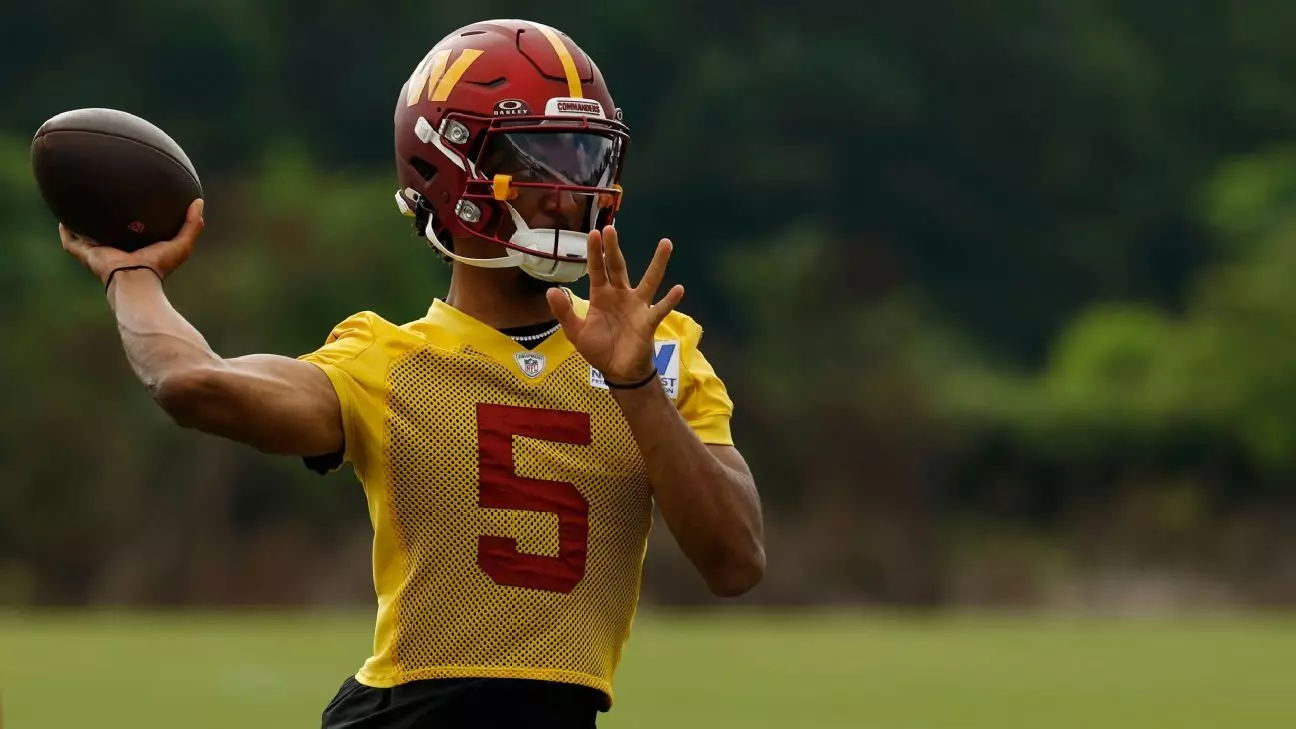In the NFL, the evolution of a young quarterback often hinges not only on physical talent but also on mental growth and leadership maturity. Jayden Daniels exemplifies this transformation vividly. A year ago, he was a rookie still deciphering the intricacies of a pro offense and acclimating to the relentless pace of the league. Back then, his focus was primarily on learning the system, not on setting standards or asserting authority within the team. Now, Daniels embraces a much different role—one that demands confidence, accountability, and assertiveness. His evolution underscores a fundamental reality in professional sports: confidence, when rooted in understanding and preparation, amplifies a player’s impact beyond mere statistics.
Daniels’ statement about his game being “night and day” from last season reveals a vital internal shift. It’s easy to forget that even the most promising rookies must first battle feelings of uncertainty and overwhelm. His acknowledgment of increased familiarity with offensive coordinator Kliff Kingsbury’s system speaks volumes about his dedication. Confidence is infectious; it elevates not only individual performance but also galvanizes the entire team. When a quarterback is comfortable, teammates naturally gravitate toward that stability, fostering a more cohesive, disciplined unit.
Understanding the Power of Familiarity and Mastery
What distinguishes Daniels’ second season from his rookie debut isn’t just experience but mastery of the offensive scheme. His words about possessing “different tools” in his arsenal highlight the importance of adaptability—an ability to modify reads, protections, and plays based on the evolving defense he faces. Mastery reduces hesitation; it allows a quarterback to make quicker, more decisive decisions. This operational confidence translates into better execution, more sustained drives, and the potential to elevate the team’s overall offensive identity.
Daniels’ initial success—winning NFL Offensive Rookie of the Year, accumulating over 3,500 passing yards, 25 touchdowns, and nearly 900 rushing yards—demonstrates that talent alone isn’t enough for sustained success. The leap he’s making now isn’t just about individual performance; it’s about him taking ownership of his role on and off the field. His understanding of the offense’s larger objectives and his emerging leadership qualities suggest a quarterback no longer content with being a transient talent but aspiring to be the cornerstone of the franchise.
Leadership — The Missing Ingredient or a Natural Progression?
There’s often a misconception that leadership must be inherent or immediate for young players. Washington’s Coach Dan Quinn challenges this notion by emphasizing that the second-year leap is sometimes more about mental clarity than charisma. Daniels’ apparent growth in leadership is evidenced by his actions—rudely but rightfully removing a teammate from the huddle for a false start. This is not just discipline; it’s a statement of standards.
Veteran running back Austin Ekeler’s remark about Daniels holding teammates accountable reflects an essential trait: the willingness and ability to assert authority when necessary. Such leadership doesn’t necessarily mean loudness or bravado but rather consistency in setting and enforcing expectations. Given that last year, Daniels was advised to focus solely on playing, his current stance signifies a matured perspective—one where he recognizes that leadership extends beyond individual stats. It’s about cultivating a culture of accountability and excellence.
The Rise of a Resilient Leader
What’s most compelling about Daniels’ growth is how his confidence is producing tangible leadership. The evolution from a cautiously learning rookie to a commanding presence signals a football intelligence that surpasses raw talent. This transition reflects a broader truth: confidence earned through understanding is a game-changer. When a player perceives himself as a leader, it influences not just team dynamics but also personal performance under pressure.
In an era where quarterbacks are increasingly expected to be vocal, decisive, and inspiring, Daniels is demonstrating that genuine leadership is rooted in competence and accountability. His willingness to hold himself and others to high standards proves that real growth isn’t linear—it’s multidimensional. His story reminds us that the path from talented rookie to seasoned leader runs through self-awareness, deliberate effort, and a mindset willing to embrace responsibility. In this ongoing development, Daniels is not merely improving as a player but transforming into the sort of leader capable of guiding his team through both triumphs and challenges.


Leave a Reply